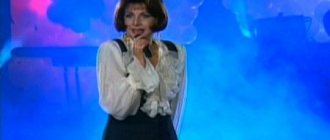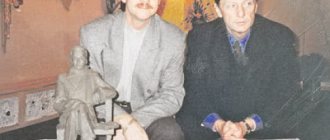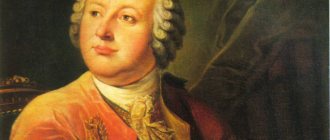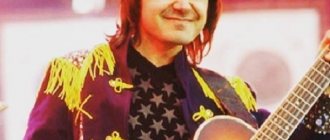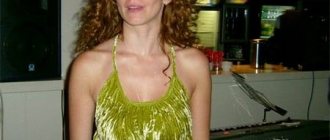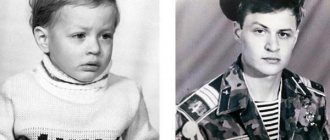TASS DOSSIER. On September 23, 2021, the Investigative Committee of the Russian Federation reported on solving the murder of singer Mikhail Krug (real name Vorobiev), committed in 2002.
On the night of July 1, 2002, Mikhail Krug’s house in the village of Mamulino (Proletarsky district of Tver) was attacked. Two unknown intruders, armed with firearms, entered a cottage belonging to the singer's family. The attackers stunned Mikhail Krug's mother-in-law and fired several shots at the musician himself. Krug received two severe gunshot wounds in the chest and stomach; his wife Irina was able to hide from the criminals with neighbors. The attackers fled the crime scene after shooting the dog.
Mikhail Krug died in a Tver hospital on the morning of July 1.
Attack on the house of Mikhail Krug
2 intruders entered the singer’s house between 11 and 12 o’clock at night. The front door was open, since Mikhail had recently returned home and had not yet had time to lock himself. Having made their way to the 3rd floor, they saw the artist’s mother-in-law. Having hit her on the head, they attempted to strangle her, but Mikhail and Irina came running in response to the noise.
Seeing them, the criminals opened fire with pistols, as a result of which the owner of the house was wounded twice and lost consciousness. Irina managed to hide on the first floor, and then run away to a neighbor, while she saw the face of one of the attackers, since he was not wearing a mask. Meanwhile, the robbers quietly left the house.
Mikhail, despite two severe gunshot wounds, came to his senses and was able to get to the neighbor who had Irina. Calls to the ambulance did not yield anything, as they refused to accept the call until the police (police) arrived. In order not to waste time, neighbor Vadim Rusakov put the wounded singer and his wife in his car and drove to the hospital.
The squad arrived and the ambulance entered the house and found Irina’s beaten mother, Masha and Sasha sleeping, and Dima (the eldest son from his first marriage) listening to music through headphones. They didn't hear anything.
At this time, in the 6th city hospital of Tver, doctors fought for the life of the wounded bard. Despite their efforts, they were unable to cope with serious injuries, and Mikhail Krug died in the operating room from loss of blood. This happened on the morning of July 1, 2002.
Farewell to the artist
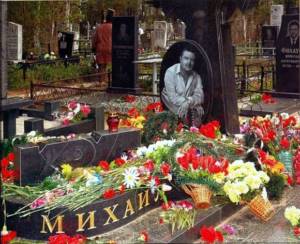
The farewell funeral service began at 10 a.m. in the Tver Drama Theater. There were a lot of people who wanted to see the bard off on his last journey, from politicians and chanson stars to thieves in law and ordinary fans of his work. As a result, the road to the cemetery was occupied by a funeral procession for several kilometers.
The funeral service for the soul of the murdered Mikhail took place in the Resurrection Cathedral, and the body was buried in the Alley of Heroes of the Dmitrovo-Cherkassy cemetery in the city of Tver.
Witnesses remember the funeral in the following words: “At about 9 o’clock executive class cars began to pull up to the building. People in black suits with wreaths in their hands came out of them, and after a while they left. At about 10, Zhirinovsky’s black SUV flew up to the main entrance to the drama theater, he quickly ran up the steps, disappearing behind the doors. Next came Governor V. Platov and the Chairman of the Legislative Assembly. Only after they laid wreaths did the doors open for us mere mortals.”
Versions of attack and murder
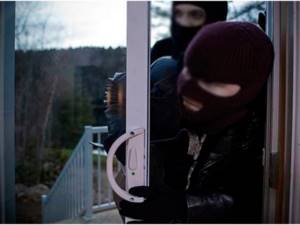
The official version of the reason why Mikhail Krug died was published only 12 years after his death. The information first appeared in the Komsomolskaya Pravda publication with the caveat that the information was received from official sources in law enforcement agencies. This was later confirmed.
So, the murder of the famous bard and chansonnier occurred because of an attempt to “run in” and receive payment from each concert. This attempt was made by someone “Lom” (A. Kostenko) and “Wolf” A. Osipov, leaders of an organized crime group who called themselves “Tver Wolves”. The goal was not murder, but intimidation of the singer who refused to pay. To do this, two of his thugs had to sneak into the house, beat up the mother-in-law, stage a robbery and escape. However, things didn't work out that way.
Currently, one of them (Alexander Ageev) has been sentenced to life under another article. At the same time, he was identified by Mikhail’s widow Irina. His accomplice was found dead, his body buried 10 years ago. Another prisoner serving a “life sentence” gave him a tip. An examination of the excavated skeleton showed that it was Mikhail Veselov, belonging to the “Wolves”.
Currently, the entire organized crime group has been liquidated:
- leader A. Kostenko was shot by unknown assailants in his own car in September 2006;
- right hand Anatoly Osipov was killed on November 28, 2005 by unknown persons;
- his son, Alexander Osipov, who took his place, is serving a life sentence according to the verdict announced on October 2, 2009;
- the perpetrator of the murder, A. Ageev, is serving a life sentence on previously imputed charges;
- the second performer M. Veselov was killed and buried in the ground by unknown persons. There is a version that in the circle of thieves this is how they dealt with the killer of the respected singer.
Thus, the entire group involved in the terrible drama that unfolded that night was punished. However, they were all punished for other crimes, since this remained unproven. Except for the situation with Veselov.
This version is official, voiced by the investigative authorities. Although during the time until the details of the death were known, other options were voiced that could well have a right to exist, but were refuted.
“Murder by concept” - this version was voiced until the moment when the thieves’ authorities themselves refuted it. It consisted in the fact that Mikhail’s songs touched on the zone, prison and many thieves’ laws, which was not allowed for a person who did not have a prison sentence behind him, such as Tanich. In fact, the version was not considered either by the criminal world or by the investigative committee - the Circle was “untouchable” in Tver, an idol for everyone: both the “reds” (MVD) and the “blacks” (thieves). Only a “scumbag” could come to him, and that’s what happened.
Another version is business. There was talk that the artist was planning to open his own chain of gas stations and restaurants. Moreover, Mikhail Krug vodka was popular in the city. In fact, he had no thoughts about starting a business. The author was completely absorbed in creativity. The above-mentioned vodka, or rather the use of his last name on the label, is a gift from Mikhail’s first love, who was into alcohol. For the sake of youthful feelings, he allowed his name to be used on the label free of charge.
The version about the singer’s hot-tempered character, which many spoke about, disappeared just like the first.
A version was expressed about an attempted robbery, but this can also be discarded, because on that day the criminals had a more convenient time for this, while only the grandmother and three children were in the house. However, they attacked after the couple arrived.
Carier start
In 1987, Mikhail was sent from work to study at the Polytechnic University, which he, however, soon dropped out of. That same year, he decided to take part in an art song competition, where he performed his composition “About Afghanistan” and took first place.
The first victory instilled in him more self-confidence, and he took songwriting seriously. The bard Sergei Klyachkin, who was the chairman of the festival, also pushed him into creativity. The musician appreciated Vorobyov’s talent and told the debutant: “Misha, you need to work...”. The aspiring bard chose the pseudonym Mikhail Krug.
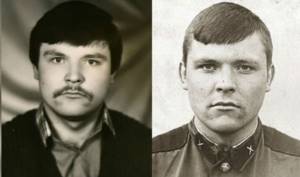
Mikhail Krug in his youth In 1989, Krug released his first album called “Tver Streets”. A year later, a second album appeared called “Katya” and a third without a title at all. However, none of these records were officially released - they were all distributed throughout Russia through piracy. Later, Krug himself re-recorded almost all the compositions from the albums on his next records. Mikhail Krug - “Zhigan-Lemon” In 1994, the artist’s new album, “Zhigan-Limon,” appeared, which became a turning point in the musician’s fate. Despite the fact that the name of the record refers to criminal themes, not only criminal, but also lyrical compositions were recorded on it. “Zhigan-Limona” was subsequently reissued several times, and it was this album that became Mikhail Krug’s symbolic invasion of Russian musical and poetic culture.
In 1994, a documentary film “Bard Mikhail Krug” was made about the musician, which was shown on the “Culture” TV channel only in 1999. For some time, Krug was simply not allowed on television - the musician’s videos began to be broadcast in 1996. The audience was the first to see the video for the song “It Was Yesterday.” “It Was Yesterday” is Mikhail Krug’s first video. Mikhail Krug performed abroad for the first time in 1997 - at the “Russian Chanson in Germany” festival he sang with the Zhemchuzhny brothers. At that concert, Krug performed four songs, one of them – “Madame” – in a guitar version. In the same year, a new soloist, Svetlana Ternova, began working with Mikhail Krug.
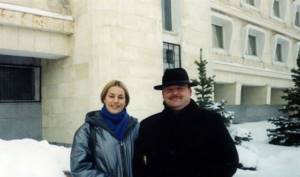
In the photo: Mikhail Krug and Svetlana Ternova, his backing vocalist. In 1998, Russian migrants in American cities became acquainted with the work of the Russian performer, and in 2000 the musician toured Israel. Mikhail Krug very often gave charity concerts, performed for free in prisons. It is worth noting that the artist himself never sat in places not so remote. Usually Krug sang songs of his own authorship, but a number of compositions were written for him by Alexander Belolebedinsky. These are “I passed Siberia”, “The process is over”, “Hello, Mom”, “Sparks in the fireplace”, “Cry, violin (In every city)”, “Chaim” and “Student”. These songs were previously performed by Arkady Severny. But “Svetochka” was written by Leonid Efremov - Krug only slightly changed the original text.
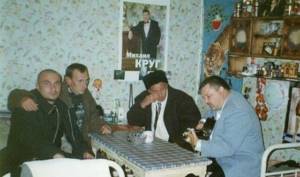
Krug’s songs are the personification of thieves’ romance. The most popular and beloved among fans was Mikhail’s song “Vladimir Central,” which became one of the most famous compositions of Russian chanson in general. The song was first performed in the album “Madame” (1998). There is an assumption that it is dedicated to thief in law Sasha Severny. Mikhail Krug - “Vladimir Central” (concert at Luzhniki, 2000) In March 1998, Mikhail Krug received the “Ovation” award in the “Russian Chanson” category. And in the fall of 1999, the musician entered the “Music Ring” together with Sergei Trofimov and defeated his colleague in a friendly duel. In the same year, the singer took second place in the Russian Chanson competition. At that time, he became one of the most popular artists in the country, although the attitude towards his work among different circles of society was ambiguous - the creative intelligentsia called the success of the Circle a symbol of the crisis of Russian culture in difficult times for the country.
Memory of the Circle
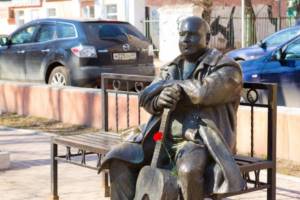
The work of the murdered poet and composer left a noticeable mark on the subsequent repertoire of many chanson performers. Numerous concerts dedicated to his memory are held only with the performance of compositions that Mikhail Krug previously sang.
The city preserves the history that once upon a time lived here one of the founders of a musical style that mixed chanson and bard performance. There are numerous references to the Circle here.
- In memory of the fact that the singer is from Tver, a bronze sculpture of a bard sitting on a bench and leaning on a guitar was installed in the center of the city. From time to time it is attacked by vandals, but is restored through the efforts of caring people.
- The artist’s family confirms that his house and grave have become a permanent place of pilgrimage for fans of his work.
- There is a museum of Mikhail Krug, opened in the building of the Lazurny night club.
- Annual music festivals dedicated to the memory of the poet’s death attract thousands of listeners and numerous musical groups from all over the country.
Mikhail Vorobyov (Circle) left a significant mark on Russian chanson and bard song. If his life had not been cut short at the age of 40, it is quite possible that Russian music would have been replenished with many more works from this cycle, unfortunately this did not happen.
“...Come to my house, my doors are open, I will sing you songs and treat you to wine. Come to my house, my doors are open... Come to my house... come kill me..."
Childhood
Mikhail Vladimirovich Vorobyov was born in the city of Kalinin (present-day Tver) on April 7, 1962. His father worked as a civil engineer, and his mother as an accountant. Mikhail became the second child in the Vorobyov family, whose daughter Olga was already growing up.
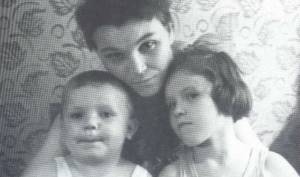
Little Misha Vorobyov with his mother and sister Olya Misha Vorobyov spent his childhood and youth in the old proletarian district, about which he later wrote the song “My Sweet City.” At a music school, the boy learned to play the button accordion, but did not complete his education. Vorobiev studied poorly at secondary school, and, as his relatives and friends recall, he constantly skipped classes.
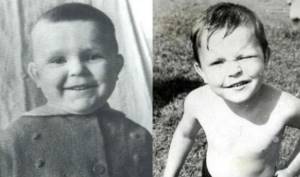
Mikhail Krug in childhood At the age of six, Mikhail first heard the songs of Vladimir Vysotsky and immediately fell in love with the work of this poet and musician. This passion helped Misha fall in love with music. At the age of 11, the boy had already mastered the guitar, and when he was 14, he wrote his first poems, which he dedicated to a classmate. One day at school, Mikhail sang the song of his idol Vysotsky, after which a scandal broke out.
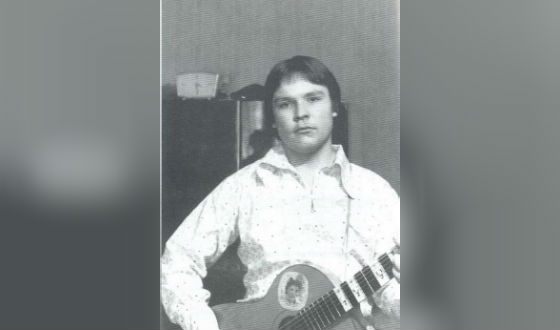
School photo of Mikhail Krug (then Vorobyov) Having received his matriculation certificate, the future musician went to the Kalinin School and received the profession of a repairman there, and then was called up for military service in the Sumy region of Ukraine.
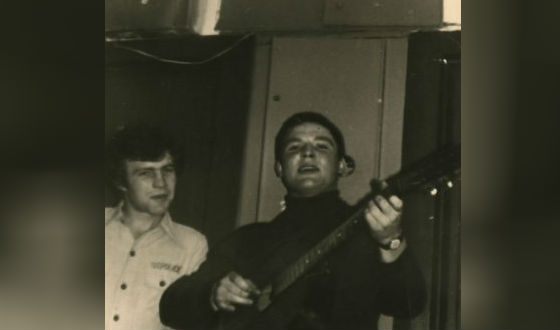
Mikhail Krug in the army Upon his return from the army, Mikhail continued to perform songs, imitating Vysotsky. From 1986 to 1993, Vorobiev worked as a driver, and after that for a short time he was the head of a city motorcade. He quickly became bored with office work, and he returned to the driver’s seat, where he worked until 1996.

